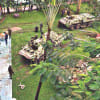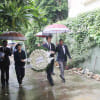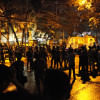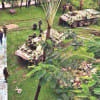Facing the worst possible scenario

How can a child turn into a monster to create random horror, death and self-destruction is a thought most people recoil from. Yet this has become a reality in today's world.
Many were ace students in elite schools and top performers at the university. Bright future was theirs for the asking. Some were talented in creative fields as musicians and singers. Others were already young professionals as engineers, doctors, IT specialists. Still others were not as privileged – average youngsters in a madrasa or a regular institution - but they too were seized by a rage or despair or a promise of a quick heavenly utopia.
It is not an exclusive domain of the male. Young women from UK, France, Australia and USA found ways of escaping from their families and friends to travel to Syria and Iraq to join the Islamic State jihadists. Defying the confining circumstances for girls in Bangladesh and South Asia, some managed to become active partisans in jihadi activities.
The Holey Artisan Café victims in Dhaka were killed by the young assailants apparently because they were foreigners or non-Muslims though three Bangladeshi Muslims were also not spared. The attackers were particularly brutal towards the women victims.
A 17-year-old Afghan refugee, armed with a knife and an axe, injured several people in a train in Bavaria, Southern Germany, including four of a family of visitors from Hong Kong. The teenager who had come to Germany alone without his family lived in a foster family. He was shot dead by police.
In Munich, 18 –year-old Ali Sonboly, of Iranian origin, but born and raised in Germany, tried to lure young people through facebook to gather at MacDonalds' restaurant and killed nine including children aiming shots at their face. Police found in Ali's room a book titled "Rampage in my mind – why students kill people." He was reported to be a fan of Norwegian mass murderer Anders Breivik who, in 2011, detonated a bomb in a crowded Oslo street killing nine, and then shot 69 participants of a workers' youth league summer camp.
What statement were they making except to vent a rage that they could not explain, a desperation they felt deeply but could not express, engulfing frustration that they could not quite fathom? So they lashed out viciously, inflicting cruelty and pain randomly, destroying their victims as well as themselves.
The flip side of it is what appears to be an increase in cruelty to children and sadistic ways children are punished and even killed – tying a child to a post and beating him to death with bystanders watching and even taking a video; killing a child by blowing pressurised air from an air pump into his rectum; scalding a child domestic help with boiling oil because she displeased her mistress in some way.
When children grow up in the midst of war and conflict, become refugees or do not have a family, one can see a cause for deviant conduct. Thankfully, even in these extreme circumstances, the numbers turning to self-destructive behaviour are very small. Then, what can be said for those being raised in a family guided by their parents in an apparently normal circumstance, but turning to irrational extremism?
Technology has quickened the pace of life and has intensified communication. A sense of entitlement, resentment about injustice, expectations in life, possibilities of what can happen, and complexities about how identities are defined have all been amplified by the unprecedented reach of communication technology.
When big powers unleash their wars and create mayhem without planning the end game or considering the full consequences, as in Iraq and Afghanistan, thus resulting in the creation of ISIL, the Taliban and the rise of Caliph Abu Bakr al-Baghdadi of Mosul, the impact on the psyche of people is deeper than ever. Not to speak of the inhuman suffering of those directly on the firing line – death, starvation, millions of refugees seeking and not finding safety.
When double standards and an Orwellian logic dictate actions on international relations, and a wound festers for decades as in Palestine, condemning millions to inhuman suffering, faith in fairness and justice cannot be sustained. When corruption, vested interests and greed for power and money in national politics subvert democracy, rule of law, and people's welfare, a positive view of future is damaged severely.
These are conditions, their impact magnified vastly by non-stop communication, cannot be controlled or influenced directly by individuals and families. Mercifully, young people, despite the extreme provocation, who turn to irrational extremism, are a tiny fraction. However, the mayhem even this small proportion can cause is tragically too evident.
What can individuals and families, at least in the sphere of raising and guiding children, do? The human child is more dependent for their survival and growth on adult care than any other living being. Do we do what should be and can be done in care, guidance, affection, love as well as providing for physical, mental, social, emotional and ethical growth and development of the young child? Unlimited indulgence and a lavish supply of toys, gifts, tablets and smartphones are not the answer.
Researcher and science writer Jonah Lehrer points to a startling research evidence. In "A Book about Love" (Simon &Schuster, 2015), he reports that children who do not form strong attachment and bonds in childhood with their parents are twice more likely to "discover" religion as adults as an emotional anchor or a base of certainty. This itself is not a problem. The problem arises when some of these "born again" believers are confused, go too far and turn to irrational extremism.
There is no formula or recipe for love. As parents and adults in the family, we must have the time, patience and commitment to listen to our children, give them care and affection, recognise their individuality, and find ample time for them. We must also re-consider our values and goal in life.
The writer is chair of Bangladesh Early Childhood Network (BEN) and professor emeritus at BRAC University.

 For all latest news, follow The Daily Star's Google News channel.
For all latest news, follow The Daily Star's Google News channel. 








Comments